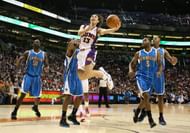#34 Steve Nash

Per-game averages: 14.3 points, 3.0 rebounds, 8.5 assists, 0.7 steals, 0.1 blocks
Shooting splits: 49% from the field, 42.8% on 3-pointers, 90.4% on free throws
Explore the NBA Draft 2024 with our free NBA Mock Draft Simulator & be the GM of your favorite NBA team.
Accolades: 2-time NBA MVP (2005, 2006), 3 All-NBA First Teams (2005-07), 2 All-NBA Second Teams (2008, 2010), 2 All-NBA Third Teams (2002, 2003), 8-time NBA All-Star (2002, 2003, 2005-08, 2010, 2012)
Records: Only player to be a 4-time member of the 50-40-90 club, 5 assists titles, all-time leader in free throw percentage at 90.4%
What makes Steve Nash different from most other players we've covered so far is that his excellence screams out best in the way his game affected his teammates' stats, rather than his own personal box score. While all players consciously try to stuff their own stat sheet when they're winning, what made Nash an all-time great and probably the best passer other than Magic Johnson in league history is the fact that he was always aware of how to get the ball to his teammates at the best time, in the best spots.
That's also part of the reason why Nash is the only MVP not named Bill Russell to average less than 20 points per game while winning the Maurice Podoloff trophy, and like Bill, he did it twice.
Contemporary NBA offenses can trace their roots back to the Seven Seconds or Less offenses run by the Suns so successfully in the mid-noughties. They did make it to 3 straight Conference Finals, although they were beaten by the best teams in the league on all 3 occasions (sorry '06 Heat, you might be champions but you weren't the best team, you just had the best player).
Drafted with the 15th overall pick by the Phoenix Suns in 1996, Nash's first couple of seasons in the league were spent as a backup point guard who could act as either a microwave scorer or facilitator. Getting traded to the Mavericks and paired with the greatest big man shooter of all time certainly helped him become a better player on and off the stat sheets, but it didn't allow him to break out to the best of his ability despite 2 All-Star Game appearances.
Faced with the choice of having to choose between Nash and Nowitzki, Cuban made the tough call of letting Nash go to the Phoenix Suns. This sparked a union between Mike D'Antoni, All-Star power forward Amare Stoudemire, shooting guard Joe Johnson and a talented offensive supporting cast. D'Antoni gave Nash the keys to his offense, and this sparked a run of 6 out of 7 seasons when the greatest Canadian baller of all time recorded 10 assists or more per game.
After languishing on bad, lottery-bound Suns rosters for the 2010-11 and 2011-12 seasons, Nash decided to go ring-chasing in 2012, joining forces with Dwight Howard, Kobe Bryant and Pau Gasol for the 2012-13 season. Injuries marred the roster and Nash all year long, and they never really got going as a unit. Injury to Bryant late in the regular season meant that the Lakers were swept out of the first round of playoffs.
Nagging nerve problems kept Nash largely off the floor in the '13-14 season, and he retired after that year.
The Suns fell short in the playoff runs in 2005 and 06 in a large part due to luck, and the Robert Horry hip-check marred their Conference Finals appearance in 2007. That a player with Nash's ability to make teammates better never won a championship is a hard pill for a true fan to swallow, but he has had a fair amount of success as a consultant for the Warriors with rings to show for the 2016-17 and the 2017-18 campaigns.
Spurs Fan? Check out the latest San Antonio Spurs depth chart, schedule, and roster updates all in one place.
